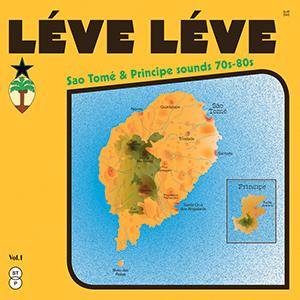Once in a while this seasoned reviewer still ends up in unchartered waters, and with 'Léve Léve: São Tomé & Principe Sounds 70s - 80s Vol.1', a compilation full of music from the small African island state of São Tome & Principe, this applies both geographically and musically. 'Léve Léve' can be translated as "take it easy" and the compilation is the work of French DJ and vinyl collector Tom Bignon aka DJ Tom B, who, while searching for Angolan music, suddenly stumbled upon rare records from São Tome & Principe. Just like Angola, the island state is a former Portuguese colony, consisting of the larger island of São Tome and the smaller Principe, surrounded by a number of micro islands like Ilhéu Bom Bom, Ilhéu Caroço, Ilhéu das Cabras, Tinhosa Grande, Tinhosa Pequena and Ilhéu das Rolas. São Tomé & Principe may be the smallest African nation, but for a very long time the islands were known as the "chocolate islands", as during the colonial period they were responsible for most of the world's cocoa production. Not surprisingly, the music of São Tome & Principe played a crucial role in the emancipation struggle against the colonial rulers. During the past five years Tom immersed himself in the (musical) history of the islands, trying to track down as many musicians as possible and save their music from oblivion: "[Luís] an employee from the main Cultural Centre introduced me to many musicians and sold me some records that belonged to his father... They had been sitting there in the jungle for 30 years, in the dust, with a humid smell that exists to this day...". In the musical traditions of São Tome & Principe amateurs of African music will certainly find similarities with music styles from other former Portuguese colonies, like Angolan semba, Brazilian afoxê or Cape Verdean coladeira. One of the first bands to leave its mark on the young nation was Os Úntúes, who mixed local rhythms like socapé, pinto and dança-congo with influences from the European pop music of the time, soukous and even some Brazilian instrumentation. Their great rivals were Conjunto Mindelo, who mixed the typical rhythms of São Tomé & Principe with Angolan rebita, creating their own puxa genre. Fascinating festive exploration of a little-known African nation and its even more obscure music culture!


